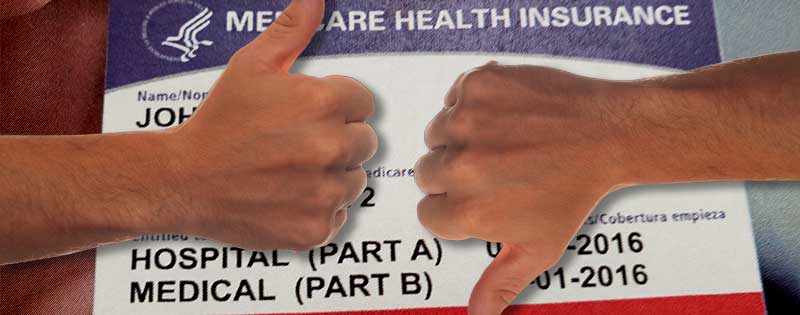by Marty Kotlar, DC, CPCO, CBCS •
President of Target Coding •
Question: Dr. Kotlar, I recently received many Medicare Advantage plan patients coming to my practice. Are Medicare Advantage plans the same as traditional Medicare Part B plans? And if I’m out-of-network with a Medicare Advantage plan, do I have to accept assignment?
Answer: Let’s begin with a few key points about the differences between traditional Medicare Part B, a.k.a. original Medicare, and Medicare Advantage plans, a.k.a. Medicare Part C.
Medicare Part B covers chiropractic care. However, it is limited to chiropractic spinal manipulation for active treatment. Active treatment qualifying conditions include pain, restricted motion, subluxations, inability to perform normal daily activities, muscle spasms, sprains, strains, and decreased functional performance. Chiropractic active treatment is typically covered by Medicare Part B because it is considered “medically necessary.” There are 7 Part B Medicare Administrative Contractors (MAC) that cover all 50 states. A MAC is a private health insurer that has been awarded a geographic jurisdiction to process Medicare medical claims or Durable Medical Equipment claims for Medicare Fee-For-Service (FFS) beneficiaries. CMS relies on a network of MACs to serve as the primary operational contact between the Medicare FFS program and the health care providers enrolled in the program. The 7 MACs are Celerian Group Company, First Coast Service Options, National Government Services, Noridian Healthcare Solutions, Novitas Solutions, Palmetto GBA, and Wisconsin Physicians Services. Again, the only services that Part B will reimburse chiropractors for is spinal manipulation, CPT codes 98940, 98941, and 98942.
Medicare Advantage (MA) plans also cover chiropractic care. MA plan patients must first enroll in traditional Medicare, then choose an MA plan. MA plans include HMOs, PPOs, and Private Fee For Service (PFFS) plans. There are hundreds of MA plans administered by many traditional insurance companies such as BC/BS, Aetna, United Healthcare, Cigna, Humana, Kaiser, etc. Some MA plans mimic Part B and only cover spinal manipulation. However, some will pay for examinations (e.g., 99203, 99204), re-examinations (e.g., 99213, 99214), extremity adjustments (98943), maintenance care (S8990), x-rays, therapies, foot orthotics, and diagnostic testing as well as chiropractic spinal adjustments.
Here is where it can get confusing and frustrating for some chiropractic billing managers:
-
- If you are enrolled in Medicare Part B as either a par or non-par provider and not enrolled in the MA plan and the MA plan has out-of-network benefits, there probably is a financial limit, and you cannot balance bill the patient.
- If you are not enrolled in Medicare Part B, not enrolled in the MA plan, and the MA plan has out-of-network benefits, there probably is a financial limit, and you cannot balance bill the patient.
- If you are enrolled in Medicare Part B as either a par or non-par provider and not enrolled in the MA plan and the MA plan does not have out-of-network benefits, you can probably balance bill the patient.
- If you are not enrolled in Medicare Part B, not enrolled in the MA plan, and the MA plan does not have out-of-network benefits, you can probably balance bill the patient.
Proper modifier use is vital to getting your claims processed quickly the first time. For MA plans, continue to use modifiers AT and GP appropriately as you are presently doing with your Part B patients. In my opinion, there is no need to use modifiers GY and GA with Part C plans. As a reminder, the GA modifier means you have a signed ABN form on file. The ABN form can only be used by enrolled Medicare Part B providers. Chiropractors not enrolled in Medicare Part B cannot issue ABNs to Medicare Part B patients. The ABN scope states that only healthcare providers and suppliers who are enrolled in Medicare can issue ABNs to patients. We recommend to continue reporting the M99.0X subluxation diagnosis codes as primary and secondary ICD-10s for Part C plans. Make sure to contact all MA plans for reimbursement specifics prior to beginning care.
Dr. Marty Kotlar is the President of Target Coding. Over the last 12 years, he has helped hundreds of chiropractors, acupuncturists, physical therapists, and massage therapists with compliance as it relates to billing, coding, documentation, Medicare & HIPAA. Dr. Kotlar is certified in compliance, a certified coding specialist, a contributing author to many coding and compliance journals, and a guest speaker at many state association conventions. He can be reached at 1-800-270-7044, website – www.TargetCoding.com, email – drkotlar@targetcoding.com.










 ▶︎
▶︎  Why is the Discount Challenge prize amount $15,024? Because that is the average “per-occurrence” fine for Medicare inducements. That’s not $15,024 per patient, that’s not per provider, that’s PER VISIT. Stinks, doesn’t it? To us, the prize amount is worth the investment if we can help our profession better understand proper discounting.
Why is the Discount Challenge prize amount $15,024? Because that is the average “per-occurrence” fine for Medicare inducements. That’s not $15,024 per patient, that’s not per provider, that’s PER VISIT. Stinks, doesn’t it? To us, the prize amount is worth the investment if we can help our profession better understand proper discounting.